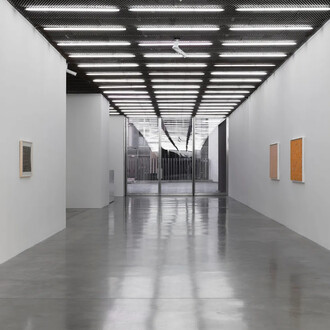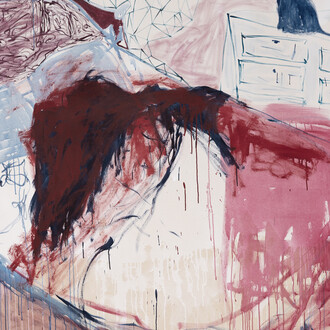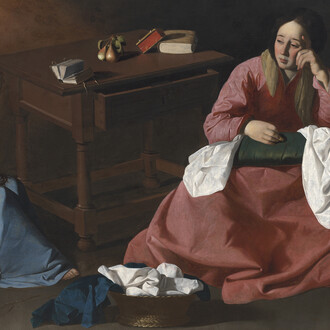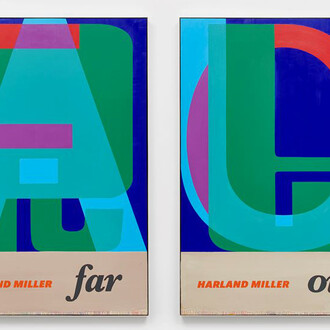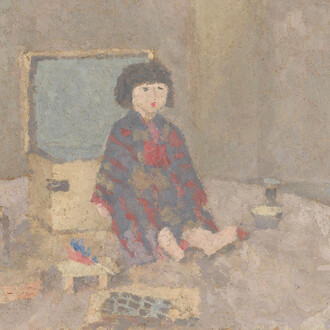Marking 30 years of collaboration between Jeff Wall and White Cube, this major survey celebrates the cultural significance of Wall’s work across the disciplines of film, photography and contemporary art. Comprising over 40 works, the exhibition documents Wall’s artistic development and pioneering career, tracing the complexity and exactitude of his pictures – from the earlier lightbox transparencies to his more recent black-and-white photographs and colour prints.
Residing between near-documentary realism and compositional artifice, Wall’s photographs draw the viewer into a world of incidental detail, rich with specificity and narrative potential. Spanning from the early 1980s to the present, Wall’s work offers a honed, singular gaze towards the subtleties of modern life – the brief exchanges, daily rituals, aberrations and chance occurrences that inform the everyday. Wall has established himself as one of the foremost proponents of sustained observation and an innovator in photography’s unique capacity for poetic representation.
Often reconstructed from memory or developed from events he has witnessed, Wall’s pictures frequently invoke the unscripted quality of photojournalistic snapshots. As Wall explains, ‘they are contemplations of the nature of documentary photography. They’re not it, but they contemplate it’. These ‘near documentary’ pictures are one of the main directions of his work over the past four decades and are present throughout the exhibition, from Mimic, made in 1982, to Fallen rider, from 2022.
Wall has engaged with documentary or ‘straight’ photography since the beginning of his career. Although he has been a leader in the reinvention of the value of photographic artifice and the illusionary domains it has opened up, he accepts no meaningful opposition between the real and the imaginary, and sees them as unique zones along a continuum of possibilities within the medium.
His engagement with straight photography can be discerned in his Diagonal composition series (1993–2000), a trio of small-scale works capturing intimate close-ups of minutiae found around his Vancouver studio. Through their composition and scale, these works resonate with traditional still lifes, elevating everyday details through pure, formal exercise.
Having worked exclusively in colour transparencies until the mid-1990s, Wall then began producing black-and-white silver gelatin prints. He had never wanted to be limited to a single photographic format, and this broadening of his repertoire had been planned for some years. He considers the dramatic, striking absence of colour to be the defining characteristic of black-and-white photography and its active presence in his work has been a way for him to bring more attention to the breadth and complexity of the medium – its way of making colour both appear and disappear. A part of this is his attention to the peculiar luminosity of monochrome photographs, an effect apparent in A woman with a necklace (2021), where the veiled glow of sunlight through a curtained window imparts an almost preternatural radiance to the beads of the necklace held aloft by the reclining woman. ‘Some subjects require the absence of colour’, Wall observes. ‘That lack, that absence, also creates a disturbance in how you perceive. I think that disturbance does something that the pictures, when they’re successful, do – which is to be almost more lifelike than life itself’.
Wall refers to his photographic methodology as ‘cinematographic’, a term he uses to convey the freedom of approach and artistic license of cinema – its tendency to distil the essence of an experience, while being liberated from the verisimilitude of the original circumstances. Mimic (1982) – the earliest lightbox work in this exhibition –reconstructs an incident witnessed by Wall, transposing the originally observed action to a nearby street oriented to capture the full intensity of the late afternoon sun. This recontextualisation enabled Wall to amplify the subtle yet charged gestures central to the picture’s subject. The ‘cinematographic’ is also present in his sometimes complex production processes, from the collaboration and technical orchestration required to make the photographs, to the digital montage often involved in creating the final composition.
The two diptychs and two triptychs on view exemplify Wall’s longstanding interest in multi-panel compositions and their narrative suggestiveness. In the triptych I giardini / The gardens (2017), Wall presents three apparently sequential moments within the gardens of the Villa Silvio Pellico in Turin. Each of the three pictures shows figures engaged in an ongoing encounter. However, two of the three pictures show each character twice, either as doubles of themselves or as simultaneously two separate characters, which complicates the matter. In other works, Wall suspends the temporal relationship between the individual panels or introduces deliberate narrative diversions and ambiguities. In Pair of interiors (2018), for instance, Wall presents a diptych showing a couple occupying what seems to be a single room seen from two vantage points. However, the couple is ‘played’ by different people in each panel, a procedure exactly the reverse of the doubling in I giardini / The gardens. Wall’s multi-panel compositions play with photography’s static and spatial qualities to compose scenes that distort or extend temporal certainty and encourage the pleasures of interpretation.





